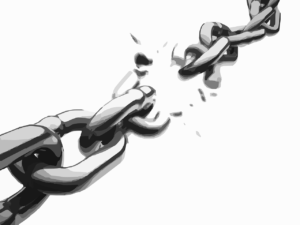Achieving high search engine rankings is a top priority for most businesses and site owners. By ensuring your webpages rank highly for relevant keywords, you can increase brand awareness, secure a high conversion rate and boost your sales. It’s essential, therefore, that you outrank your competitors and reach your target market.
However, effective SEO isn’t just about achieving high rankings. To ensure on-going success, you need to maintain these rankings too. Many businesses assume the hard work is over once they’ve secured a top spot on search engine results pages (SERPs). In reality, rankings aren’t static, and your webpages could drop down the list at any time.
If you’ve noticed your rankings are gradually reducing, it’s important to understand why. Once you know what’s causing you to lose your position on SERPs, you can take action. The most common reasons for losing rankings include:
1. Dead Backlinks
Backlinks are a critical element of SEO. Known as a key factor of off-page SEO, they connect your webpages to external sites. High authority domains are particularly important when it comes to securing backlinks as they help to endorse your own webpages.
However, websites change over time. Securing a high authority backlink one month doesn’t necessarily mean it will be there next month or month year. In the same way that your internal links may need to be updated or removed to eradicate dead links, it’s important to check the validity of your backlinks.
If you’ve cultivated a good backlink network, don’t simply assume that it will continue to help you get great rankings. If these pages are removed or modified, your backlink could disappear. As you won’t necessarily be notified, the first sign of disappearing backlinks could be a drop in your rankings.

2. Out of Date Content
Google rates websites that regularly update their content. As well as giving users access to fresh information, posting new content gives people a reason to revisit your site. In a best case scenario, failing to update your content means an increased bounce rate, reduced time being spent on your site and a boring user experience. At worst, out of date content could mean you’re delivering inaccurate information or advice to your users.
It’s easy to see why Google won’t rank webpages highly if they’re not updated. The search engine is focused on redirecting to content that’s accurate, valid and useful. Out of date content simply doesn’t tick these boxes, so you can’t expect to rank highly with it.
3. Evolving User Behaviour
To secure consistent high rankings on SERPs, you need to cater to user behaviour. Knowing how users search for information is critical to making sure they find your content, for example. But user behaviour can change at an alarming pace. When users begin to search different or consume information in a changing way, your site needs to be ahead of the game.
A good example of this is the move towards non-text based searches. Increasing numbers of people are using voice searches to access online content. If your SEO strategy is still focused solely on text-based searches, you aren’t catering for the change in user behaviour. As a result, you can expect your rankings to drop over time.
No matter how effective your SEO activities have been thus far, you need to pre-empt and respond to changes in user behaviour if you want to maintain high rankings.
How to Deal with Plummeting SEO Rankings
If you’ve noticed your rankings dropping, it’s essential to take steps to rectify the situation. The fact that you’re already moving down SERPs means things are already going wrong with your SEO campaigns. By responding swiftly, you can prevent your rankings from dropping even further and, potentially, climb back to the top of the rankings once again.
To stop your hard work and SEO campaigns going to waste, take a look at these top tips for preventing a decline in your SERPs rankings…
1. Check for algorithm changes
Google and other search engines introduce new algorithm changes all the time. In addition, existing algorithms may be modified slightly. If you’re managing your SEO in-house, it’s vital to keep on top of these changes.
When algorithms change, the way sites are indexed and ranked can change accordingly. This means you’ll need to tweak your webpages and SEO activities to ensure you’re satisfying the latest algorithms. Maintaing high rankings is an on-going process, so keeping on top of algorithm changes should be a top priority.
2. Understand user behaviour
If you’re losing your position on page 1 on Google, it may be because users are searching for content slightly differently. They may be using a different form of tech to access content or they may simply be inputting different words and search terms. Whatever the change is, it’s important to understand it. Once you know how user behaviour is changing, you can update your SEO campaigns in response. This will ensure your content is still being presented to users when they search for terms and keywords that relate to your business, brand or site.
3. Confirm backlinks are active
As well as checking your own site for dead internal links, you’ll want to ensure your backlinks are still alive and kicking. If they’ve been removed or if the authority of a site you’re linked to has dropped, this could be affecting your rankings. Fortunately, this can be very easy to rectify. By securing new, high authority backlinks, you can effectively re-endorse your webpages in the eyes of Google. In doing so, you’ll prevent your rankings from dropping any further and begin to climb back up to the top.
4. Update your content
If you haven’t implemented a content marketing strategy, it’s time to do so. Your site needs to be updated on a regular basis, so plan ahead and schedule information, insightful and original content. In addition to this, revisit your existing content and update it where necessary. If you feature cornerstone or evergreen content on your site, for example, make sure it is still accurate and relevant to your users.
Remember – content is solely about what’s present on your site. Your content extends to your social media posts, video marketing and email newsletters. Regular audits will help to ensure your content is up to date, accurate and properly optimised.
5. Get a FREE personalised video audit
If you’ve updated your content, checked your backlinks, studied user behaviour and responded to algorithm changes but your rankings still aren’t where you want them to be – it’s time to seek expert help. With a free, personalised video audit, our expert SEO strategists will analyse your website and identify issues which could be harming your search engine rankings.
With a tailormade video for you to access, you can benefit from bespoke advice and information relating to your site. Why make do with generic tips when you can access custom advice for free?
Restore Your SEO Rankings Now
To find out more about maintaining top SEO rankings, get in touch with ClickSlice today. You can arrange your FREE personalised video audit by contacting us on 020 3287 3638 or emailing us at hello@clickslice.co.uk.
Simply tell us your URL, keywords and areas you’re targeting, and our in-house SEO consultants will begin preparing your bespoke website audit. With limited free audits available, there’s no time to waste if you want to secure top rankings. Contact ClickSlice now and secure the top spots on SERPs today!











